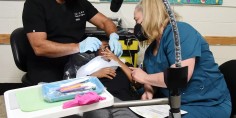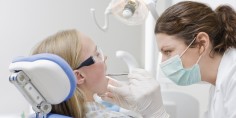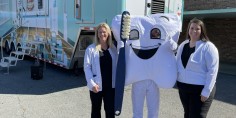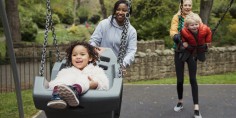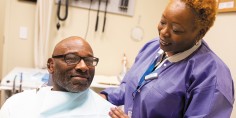1. The Baby-Friendly Hospital Initiative began in 1991.
UNICEF and the World Health Organization launched the effort in response to research that linked breastfeeding to health benefits.
In the United States, the American Academy of Pediatrics recommends that infants be exclusively breastfed for about the first six months, with continued breastfeeding alongside introduction of complementary foods for at least one year. Three of four mothers in the U.S. start out breastfeeding — but at the end of six months, only 13 percent of babies are exclusively breastfed.
Research shows that mothers who give birth at Baby-Friendly hospitals and birthing centers are more likely to sustain breastfeeding at 6 months and 1 year. A 2017 Swiss study, for example, the median duration of any breastfeeding was nearly 33 weeks in Baby-Friendly hospitals, 30.5 weeks in former Baby-Friendly hospitals, and 28 weeks in hospitals that had never had a Baby-Friendly designation. The rate of exclusively breastfed babies was highest for babies born in current Baby-Friendly facilities.
2. Baby-Friendly Hospitals have successfully completed a complex process to earn the designation.
They follow certain procedures that optimize mother-baby bonding and promote breastfeeding, such as encouraging mothers to hold their babies skin-to-skin immediately following birth.
More than 500 hospitals and birthing centers in the United States have earned the Baby-Friendly designation. In North Carolina, 14 facilities (or 13 percent) have achieved that status; South Carolina has 14 designated facilities (or 26 percent).
3. The Carolina Global Breastfeeding Institute was the first public health breastfeeding center of its kind.
Based in the Gillings School of Global Public Health, the institute works closely with Baby-Friendly USA, the accrediting body and national authority for the Baby-Friendly Hospital Initiative in the United States. In addition, the institute has served as a subcontractor providing technical expertise to the Centers for Disease Control and Prevention EMPower Breastfeeding initiatives.
The Carolina Global Breastfeeding Institute also has a three-year, $1.3 million grant from the W.K. Kellogg Foundation to increase the number of women and men of color serving as certified lactation consultants in vulnerable communities. The grant will help establish lactation consultant training programs in communities of color; in the first year of funding, the project will work with Johnson C. Smith University in Charlotte and North Carolina A & T State University in Greensboro. Other institutions in the South and Southwest will be recruited to in years two and three.
4. The ENRICH Carolinas project began in January 2018.
In collaboration with Population Health Improvement Partners, the institute will provide on-site coaching, host learning collaboratives and webinars, and offer technical assistance for hospitals moving through the Baby-Friendly and North Carolina designation processes.
The institute will also offer training to affiliated prenatal clinics, child care providers and community leaders, and address the support moms need after they leave the hospital and return home.
5. The initial goal is to work with up to 20 hospitals that have signed on to complete designation.
Becoming Baby-Friendly is complex and time-consuming, and many facilities, especially in underserved areas, need outside support to be successful. “Our coaching is all about taking the fear out of moving through the designation,” Sullivan says. The institute and Population Health Improvement Partners will share the lessons learned from helping a diverse group of facilities through the effort.
6. Looking forward, the institute would like to help all hospitals in the Carolinas earn Baby-Friendly status.
Experts believe that would be the first time for every hospital in one state — let alone two states together — to achieve the designation. Sullivan estimates that some 100 facilities in North Carolina and South Carolina have not yet achieved Baby-Friendly designation.


